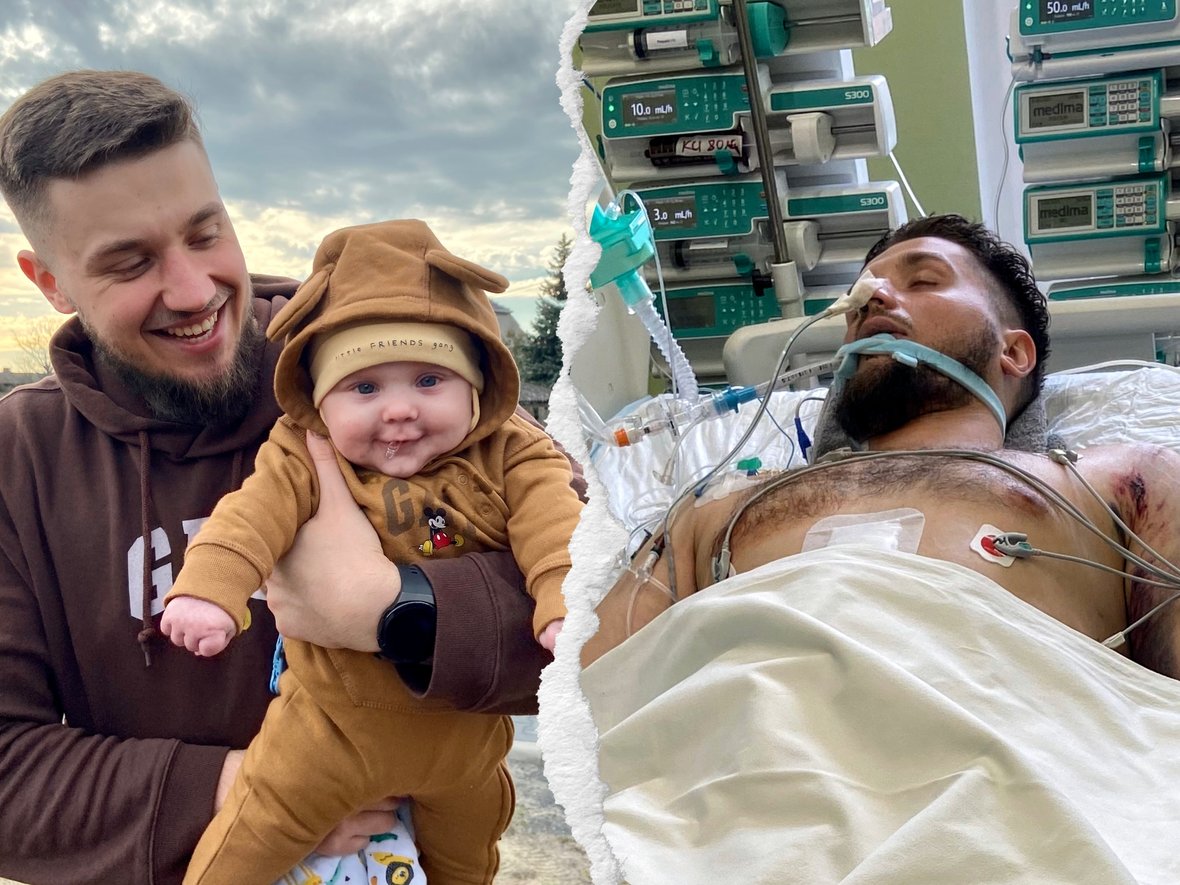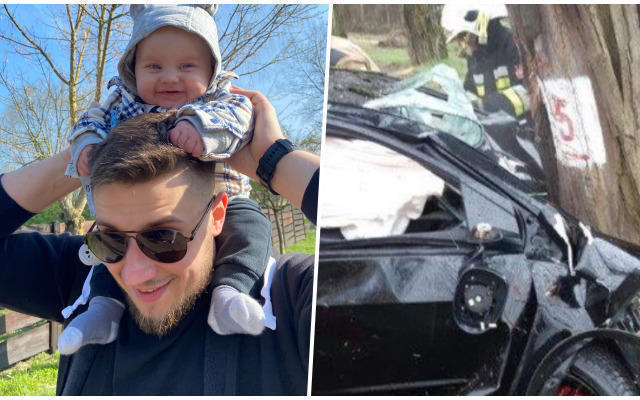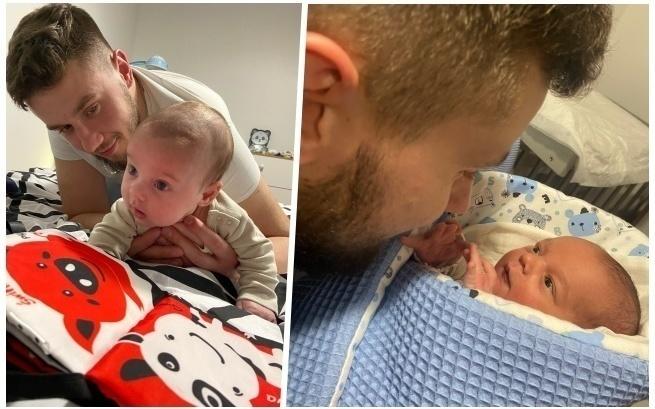The Heartbreaking Story of Juan Rodriguez: A Father's Grief, A Call for Change 3122c
The pain is always there.
It sits inside Juan Rodriguez like an invisible weight, pressing against his chest, following him through every room, every conversation, every attempt to live a life that no longer feels like his own.
In the eighteen months since his twin babies — Luna and Phoenix — perished in the back seat of his car, grief has become his shadow.
It wakes with him in the morning.
It lies beside him at night.
It pulls him backward into a day he wishes he could erase, a day that broke him forever.

Juan Rodriguez, a father of five and a social worker dedicated to helping veterans rebuild their lives, never imagined he would be the one needing saving.
Yet here he was, forty years old, speaking publicly for the first time since the tragedy — his voice trembling, his hands twisting, his memories fracturing into pieces he struggled to hold.
“It’s a struggle every day,” he admitted.
And it was.
Every hour.
Every breath.
To cope, Juan and his wife, Marissa, did something few could understand: they stepped into the public eye, not to excuse what happened but to prevent it from happening to someone else.
They became advocates for an issue many still believe could never touch them — the silent, deadly danger of children dying in hot cars.

Juan never knew how common it was.
Most people don’t.
This year alone, twenty-four children died of heatstroke after being left in cars in the United States.
In 2019, fifty-two children died.
A record fifty-three died in 2018.
Numbers that look sterile on paper.
Numbers that become unbearable when they live inside your home.

The day everything changed was a warm July morning in 2019.
Juan left his home in New City and drove toward the Bronx, the same route he’d taken countless times before.
His beautiful twins, their tiny bodies snug in their car seats, rode quietly in the back.
He planned to drop them at day care in Yonkers, just as he always did.
But grief’s cruelty lies in its ordinariness — routines so familiar they blur into autopilot, moments so repetitive that the mind fills in what it believes happened.
Juan believed he had dropped them off.
He believed it so completely that the truth did not exist in his consciousness for the next eight hours.

He walked into the James J. Peters VA Medical Center, where he counseled veterans fighting their own invisible wars.
He spoke to them about trauma, healing, survival.
He never imagined that at that very moment, his own babies were fighting a battle they could not survive.
Hours later, his shift ended.
He walked back to the car under the fading afternoon sun.
He turned the engine on.
He began driving home.
And then — a glance.

A flicker of movement in the rearview mirror.
His breath stopped.
His heart dropped so violently he thought he might faint.
“Oh my God, oh my God!” he screamed as he pulled over.
The world tilted.
Time collapsed.
Not even nightmares dared to be this cruel.
“I killed my babies!” he wailed.
Luna and Phoenix were foaming at the mouth.
Their organs had failed.
Their body temperatures had reached one hundred and eight degrees.

Suffering like that leaves marks on a soul that never heal.
For months, Juan replayed the moment repeatedly, trapped between disbelief and horror.
He was a social worker — someone trained to recognize danger, to help others navigate their darkest moments.
How could this have happened to him?
How could his mind betray him so completely?
He learned, painfully, that it happens to countless devoted, loving, exhausted parents every year.
Parents who are overworked.
Parents whose routines blur under pressure.
Parents whose brains, under stress, make tragic, irreversible mistakes.

“It’s a serious public health issue,” Juan said.
One that nearly no one talks about.
Now he thinks about it constantly when treating others.
“Complacency,” he said, “is the enemy.”
And it was complacency — innocent, unintentional — that cost him everything.
That is why Juan agreed to appear in the upcoming documentary “Fatal Distraction,” directed by Susan Morgan Cooper.
The film does not judge.
It does not condemn.
It bears witness.
It listens to parents like Juan and Marissa.

Parents who loved their children more than life itself, and who now carry a grief that reshapes every moment of their existence.
“There are sensors that alert us when we leave our keys behind,” Cooper said.
“Why isn’t there something that alerts us when our child is still in the back seat?”
It’s a fair question.
One that stings with the weight of every life lost.
But what struck Cooper most was not the tragedy itself — it was the crushing judgment from the public.
“These parents suffer so much shame, guilt, and self-loathing,” she said.
“If a child dies from drowning, society gathers around the family with support and compassion.”
“But when a child dies in a hot car, the parents are treated like criminals.”

The pain of that judgment becomes another layer of grief — one that isolates.
One that suffocates.
Juan felt it too.
But in the documentary, he found something unexpected: understanding.
He said the film “captures exactly what has happened to families like ours.”
Families stretched thin.
Families trying their best.
Families who make one terrible mistake in a world that offers no mercy.
Although Juan appears in the film only briefly, Cooper chose not to push him for more.

His grief was still too raw, too early, too immense.
“The punishment he and his wife give themselves is far worse than any jail,” she said.
“They are suffering a great deal.”
Juan was initially charged with manslaughter and criminally negligent homicide.
Headlines marked him as a monster.
Strangers hurled insults.
But eventually, the legal system recognized what experts already knew — this was not a crime born of neglect.
It was a tragedy born of a human brain under pressure.

Juan pleaded guilty to misdemeanor reckless endangerment.
He served no jail time.
But freedom from prison is not freedom from pain.
He will never escape the sentence he carries inside — the memory of Luna and Phoenix, the weight of that day, the ache of love that will forever be unfinished.
The pain is always there.
And Juan carries it not as a burden he resents, but as a reminder of the two little souls who changed his life in the brief time they were here.
He speaks for them now.
He advocates for them.
He hopes that by telling his story, some other parent — tired, rushed, overwhelmed — will pause long enough to check the back seat.
Long enough to save a life.
Long enough to break the chain of tragedies that has claimed too many children already.
Juan Rodriguez will never stop grieving.
But he will also never stop fighting.
For Luna.
For Phoenix.
For every child who still has a chance to be saved.
Karol’s Journey to Recovery: A Family’s Desperate Call for Help 1836c

A Family’s Fight: Karol’s Road to Recovery and a Desperate Call for Help
Our peaceful life came crashing down in an instant. The phone call I received with the devastating news left me pale with fear. The fight for my fiancé and the father of our 6-month-old son began unexpectedly. No one could have predicted this.
Karol is a 24-year-old coordinator at a company specializing in drive systems. He is a highly respected and dedicated employee. A car enthusiast, he loves skiing and diving. He is also a proud father to little Nikodem and a wonderful, loving partner. Karol has many dreams and plans he still wants to fulfill. Our son is the apple of his eye, and Karol’s greatest joy is being a father.
The Tragic Accident That Changed Everything

Unfortunately, on April 11th, during a massive downpour, a tragic car accident occurred. The car was destroyed beyond recognition, and Karol was rushed to the hospital in critical condition. My beloved fiancé suffered from a severe axonal brain injury, broken fibulas and ankle joints in both legs, a broken right knee, multiple rib and sternum fractures, and pelvis damage. His lumbar and cervical spine were displaced, and his left shoulder was dislocated.
Karol has already undergone three surgeries. He’s had surgery on his liver and part of his colon, stabilization surgery for his broken legs, and pelvic surgery. After the accident, he had to be induced into a medically induced coma. Now, he’s awake and is in the intensive care unit. Unfortunately, he cannot even speak yet. Doctors are unanimous—his only chance for recovery is rehabilitation.
A Young Man Determined to Fight
Karol is a strong, determined young man. He has always been driven, and his family has always been his priority. I know that he’s fighting now, and I am certain that he can win this battle. But the truth is, he cannot do this alone. This is why I am turning to you for help. The rehabilitation he needs is vital for his return to us—back to me, back to his son, and back to living the life he deserves.
I am asking for help in funding a rehabilitation program that will last for several months. This is our only chance for Karol to regain his strength and return to his family. With your support, Karol can have the chance to recover and, eventually, to live a full life again.
The Cost of Recovery: A Family in Crisis
The road to recovery for Karol is long and costly. The initial surgeries were only the beginning, and now, rehabilitation is essential for him to regain mobility, strength, and function. The medical expenses are overwhelming, and I am doing everything I can to support him through this. However, we cannot afford the cost of the rehabilitation treatment alone.
The cost of a rehabilitation program that will be long and intensive is far beyond what we can manage. Every day Karol spends in the hospital is a financial burden that adds to our stress and worry. But more than that, it is a constant reminder that without proper rehabilitation, Karol may not fully recover, and our family will never be the same.

We are a young family, with a small baby who needs his father, and I cannot imagine a life without Karol by my side. The thought of our son growing up without his father breaks my heart, and I will do everything I can to make sure that Karol gets the care and rehabilitation he needs. But I need your help to make that happen.
A Mother’s Plea: Rebuilding a Family
My son Nikodem is only six months old. He needs his father. He deserves to grow up with both of his parents. Karol is everything to us. He has been a wonderful partner and an incredible father from the moment our son was born. I can’t bear the thought of him not being there for our child as he grows up. The family we’ve dreamed of, the life we’ve planned together, is now at risk. And it’s all because of a tragic, unforeseeable accident.
But we still have hope. Karol is strong, and with the right rehabilitation, I believe he can get back on his feet and return to the life he loves. He deserves the chance to be with us again, to be the father he was meant to be. We need to give him that chance, but we cannot do it without your help.
Rehabilitation: The Key to His Recovery
Rehabilitation is essential for Karol’s recovery. The path ahead will be long, and he will need months of intensive physical therapy and support to regain his strength. His body has been through so much, and each day of recovery is a step closer to his former self. However, this rehabilitation is expensive, and we cannot afford it on our own.
With your support, Karol can receive the rehabilitation treatment that will give him the best chance at recovery. This is not just a chance to walk again; this is his chance to return to his family, to be the man and father he was before the accident. We want to see him smile, to hear him laugh, and to watch him bond with our son. We want to be a family again, and with your help, that dream can become a reality.

The Importance of Family Support
As we navigate this difficult time, we are leaning on the strength of our family. But even with the support of our loved ones, the financial strain is too much for us to bear. We need your help to make sure Karol receives the care he needs. Every donation, no matter how small, will bring him one step closer to the life he deserves.
I am asking for your kindness, for your generosity, and for your support. Please help us bring Karol back to us. He is the heart of our family, and without him, we are incomplete. With your help, we can rebuild our lives, and Karol can regain the strength and independence he needs to be a full partner in our family again.
A Final Plea for Help
Please, help us bring Karol home. He has so much more to offer this world. He has dreams, plans, and a family that depends on him. We will not give up on him, and we will do everything in our power to make sure that he gets the rehabilitation and care he needs. But we cannot do it alone.
Thank you for your support, for your generosity, and for your compassion during this difficult time. Together, we can help Karol regain his life and his future.





